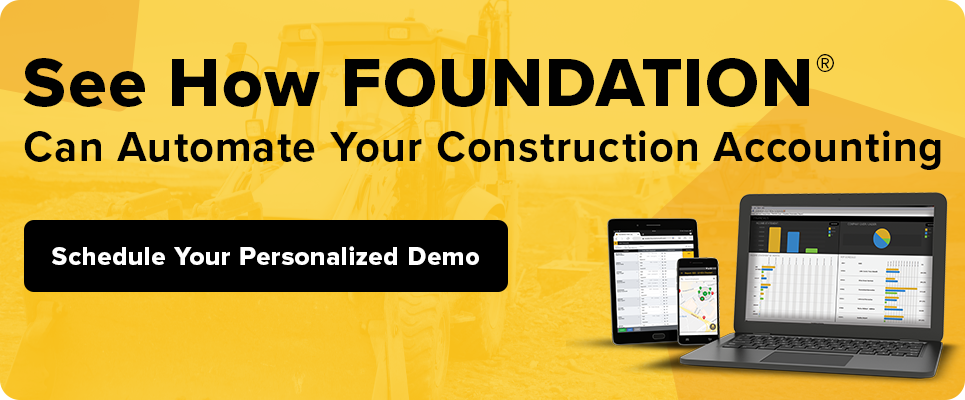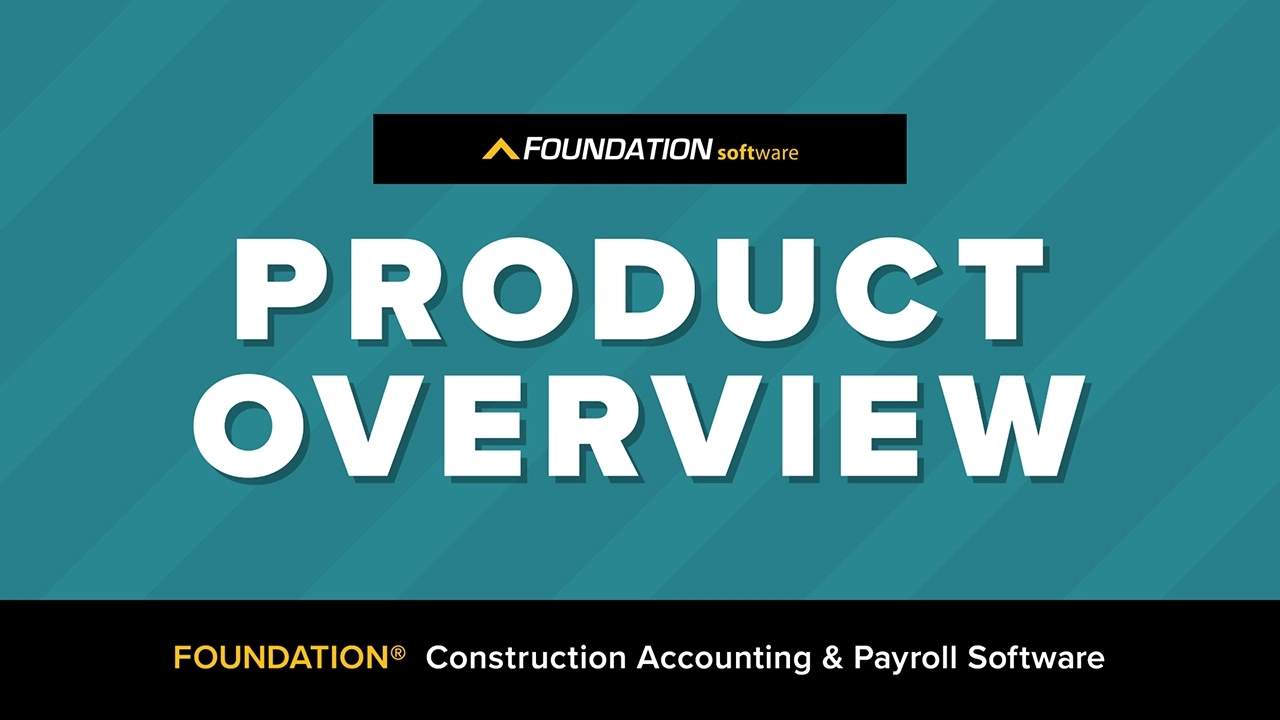
When you’re first starting out in the commercial construction industry, it can feel like a real challenge. As a business owner, your days are filled with site visits, estimating costs, managing teams, and ensuring project deadlines are met.
According to the Associated General Contractors of America (AGC), there were more than 919,000 construction companies in the U.S. in the 1st quarter of 2023. With a saturated market, making sure your business stands out from the pack is crucial to earning jobs.
But don’t worry — if you’re in your first year, the challenges you’re facing are completely normal. With the right approach and tools, you can build a solid foundation for a profitable business.

Below, we’ll cover key considerations for new contractors and small businesses entering the construction industry and how construction accounting software can help streamline operations, increase profitability, and support growth.
Key Takeaways for Contractors New to the Construction Industry:
- Accurate cost estimation, budgeting, and cash flow monitoring are crucial for new contractors to avoid financial pitfalls and ensure profitability.
- Adhering to regulations, developing risk management strategies, and prioritizing safety training are essential for building a reputable and sustainable construction business.
- Effective project management, including realistic timelines, daily progress tracking, and proactive communication, can help new contractors deliver projects on time and within budget.
- Integrated construction accounting software can streamline operations, improve financial decision-making for more profitable decisions, and enhance overall efficiency, making it a valuable tool for new contractors.
Tip #1: Prioritize Financial Tracking
Effective financial management is crucial for handling the complexities of construction, especially in your first year. Cash flow issues are a common hurdle for new contractors, so better budgeting and regular tracking are essential.
Gather Comprehensive Cost Data
Begin by thoroughly researching specific labor costs and material costs. Try to:
- Review past bids from collaborators in the industry
- Analyze successful bids from competitors
- Utilize popular industry templates
Accurate cost estimation reduces surprises and enhances your ability to submit competitive, profitable bids and win more jobs.
Account for Overhead and Contingencies
Indirect expenses often get overlooked but should always be included in your budget to avoid future surprises. Common mistakes are not accounting for:
- Transportation
- Insurance
- Maintenance
It’s also important to build a buffer for construction projects; according to The National Academy of Construction, contingency should be 5-10% of the total budget.
This is meant to cover unexpected expenses, such as price fluctuations for materials or unplanned labor, to protect your profit margin if anything goes off-track.
Set Up a Budget and Monitor Cash Flow Weekly
Unforeseen expenses, delayed payments, and project overruns can all drain cash reserves and put your construction business at risk.
Every project should have a detailed budget that’s tracked consistently. This will give a clear view of costs at each stage and allow adjustments to be made quickly to avoid overruns.
Create a weekly habit of reviewing your cash flow, paying attention to any discrepancies in anticipated vs. actual revenue and expenses to anticipate and avoid potential shortfalls.
One way to avoid delays is by setting up a system to generate and send construction invoices as soon as milestones are reached.
Get More Construction Business Tips
As you start your construction business. Get access to more resources and helpful industry tips. Fill out the form to customize your experience.
Tip #2: Focus on Compliance and Risk Management
Compliance in construction isn’t just about meeting legal and regulatory requirements — it’s about ensuring your company’s stability and reputation.
Adhering to safety protocols, understanding environmental regulations, and meeting state-specific construction payroll guidelines are critical for avoiding costly delays or penalties.
Familiarize Yourself with Regulations
Compliance requirements for the construction industry vary by state and project type, so take the time to understand any laws or building codes relevant to your area and trade.
Develop a Risk Management Strategy
Identify risks associated with each project, such as weather delays or potential hazards, and then outline a detailed response plan to minimize these risks.
This could involve:
- Contingency budgeting
- Additional team training
- Sourcing backup suppliers
Investing time in understanding and creating these can save costly penalties.
Prioritize Safety Training
Making safety a core part of your business culture will protect your team and strengthen your company’s reputation.
Frequent accidents or oversights can damage morale, hinder productivity, and lead to costly fines or even legal action.
Customize safety protocols for each site’s unique risks and hold regular training sessions to keep everyone up to date on best practices.
Tip #3: Embrace Project Management Principles
When you’re new to the industry, project management can be daunting, but establishing good habits early on is essential for long-term success.
Create a Realistic Timeline
Effective project management keeps timelines on track and minimizes budget overruns.
Start by breaking down each project into phases and assign estimated durations to each, and factor in potential delays, such as weather or material delivery schedules.
Track Progress Daily
Set aside time each day to review progress against the schedule. This allows you to make timely decisions and resolve issues before they impact the overall timeline.
Communicate Proactively with Clients and Teams
Keep communication channels open with real-time information for everyone involved in a project. Regularly update clients and field staff on progress to minimize misunderstandings and reduce downtime.

Tip #4: Build Relationships and Market Your Services
The construction industry is highly competitive. For both new contractors and established construction firms, it’s essential to build strong relationships with construction professionals, clients, suppliers, and construction subcontractors to help your business thrive.
Marketing your services effectively can help you attract more business. You can do this by:
- Attending industry events
- Engaging with local suppliers
- Staying connected with clients post-project
- Creating an up-to-date website
- Maintaining a social media presence
Tip #5: Track Every Project’s Profitability
One of the easiest mistakes for new contractors is to focus solely on revenue rather than profit. High revenue doesn’t necessarily mean high profit — project costs and overhead allocation can eat into earnings if not managed carefully.
After each project, analyze your actual costs vs. estimates. Look for areas where you can cut costs, improve efficiency, or adjust your bidding strategy to reflect the true costs of similar projects in the future.
As you grow, focus on jobs that yield the highest profit margins. This approach will increase your overall profitability and help you decide which project types to prioritize.
Tip #6: Use Construction Accounting Software
Construction-specific accounting software can make your first year smoother by automating and streamlining essential operations.
Here’s how accounting software designed for the construction industry can benefit new contractors:
- Job Cost Tracking: Job costing software allows you to track expenses with real-time data and provide real-time visibility into profitability, so you can stay on top of project costs and identify profitable projects.
- Cash Flow Management: Track financial transactions and accounts payable and receivable and improve cash flow visibility to prevent bottlenecks.
- Integrated Payroll: Simplifies complex payroll needs, such as multi-state timecards and certified payroll.
- Financial Reporting: Quickly generate job cost reports to review profitability, analyze job costing, and maintain accuracy across financial documents.
- Centralized Project Management: Monitor timelines and adjust plans to keep tasks organized and on schedule.

See How FOUNDATION® Can Simplify Your First Year in the Construction Industry
The construction industry offers incredible potential for those willing to learn and grow. In your first year, staying organized, building strong foundations, making data-driven decisions, and leveraging the right tools will make a significant difference in your success.
FOUNDATION construction accounting software can be an invaluable resource, supporting you with tools for accurate bidding, financial management, compliance tracking, and much more.
With each project and growing construction experience, you’ll become more confident and efficient, laying a foundation for a successful future in the construction industry.
By investing in construction accounting software like FOUNDATION, construction businesses can gain a competitive edge and position themselves for long-term success in the industry.
Chat with a specialist today to learn more!
Share Article
Keep on current news in the construction industry. Subscribe to free eNews!
Our Top 3 YouTube Videos
Learn about our software more in depth with product overviews, demos, and much more!

Our ACA reporting & e-filing services include official 1094-C and 1095-C IRS reporting, optional e-filing (no applying for a TCC code required), mailing to your employees and experienced support to help you.

There are plenty of reasons to make FOUNDATION your choice for job cost accounting and construction management software — just ask our clients!

From job cost accounting software, to construction-specific payroll. Get an overview on your next all-in-one back-office solution.



